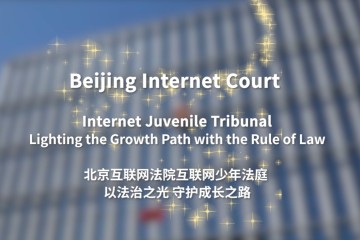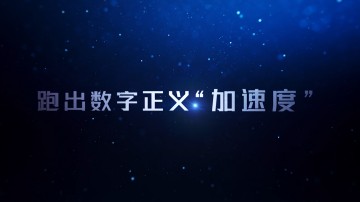Beijing Internet Court promotes one-stop diversified dispute resolution and litigation source governance
The Beijing Internet Court prioritizes non-litigation dispute resolution mechanism and actively integrates it into overall social governance.
In the first half of this year, the court resolved 3,386 disputes through diversified resolution mechanism, a year-on-year increase of 118 percent, ranking first among the courts in Beijing.
The average duration of mediation was 35 days.
Application of modern information technology in diversified dispute resolution
The court pays great attention to the application of modern information technology in diversified dispute resolution.
A full-process online mediation platform has been adopted that incorporates online case filing, electronic delivery, online mediation automatic generation of mediation agreements and online judicial confirmation.
All the mediation organizations and mediators are enrolled in the system, and the mediation platform can complete the case assignment by only one-click operation.
The mediation platform and the e-litigation platform allow for interaction between different internet domains.
The parties only need to submit materials once in their case application. All materials in the mediation process can be transferred to the e-litigation platform, making the litigation and mediation process smoother.
The mediation platform supports two-way data synchronization between the PC and mobile terminals and helps the parties participate in the mediation anytime and anywhere.
During the COVID-19 period, online mediation was fully effective and brought parties a more convenient and efficient litigation experience.
A copyright case mediated by He Jianhua, a mediator of the Committee of People's Mediation for Intellectual Property Disputes of the Patent Protection Association of China.
Thanks to her professional mediation and guidance, a settlement agreement was reached in just two hours and was fulfilled immediately.
"I don't need to register and log in. Entering the six-digit code, I can apply video mediation, and don't need to go to Beijing to file a lawsuit. It saves time and cost," said Li from Hubei province.
Beijing Internet Court currently 25 invited mediation organizations, 76 mediators and 32 invited mediators. It has included a number of mediation organizations specializing in IP disputes.
Simplify trial process to improve efficiency
Beijing Internet Court continuously explores dispute resolution reform, and guides the public to choose an appropriate way to resolve their disputes and find resolution. Simple cases that cannot be resolved through non-litigation way will be transferred to a fast-track adjudication team for expedited trial.
In this year's first half, eleven judges of the fast-track team of the court, or 26 percent of the court's judges, concluded 9,549 cases, 868 cases per capita, accounting for 70.7 percent of the 13,506 civil cases in the same period. The team simplified the complicated trial process and helped solidify the internet adjudication rules.
In a case involving copyright of music products, a large number of lawsuits and appeal cases were filed as the case involved more than 300 songs.
Since the case will take a lot of manpower and time through a traditional civil mediation, A tabular mediation statement was prepared after the mediation succeeded. It covers payment clauses, interest clauses and acceptance fee clauses. Generally, it improves the parties' litigation service experience.
From online mediation to the issuance of the tabular mediation statement, the entire process took less than 20 minutes. Nearly a hundred cases involving hundreds of songs, including litigation mediation and appeal procedures, were resolved in the tabular mediation statement.
The innovation of the internet trial brought visible convenience in this 20-minute fast-track trial, commented by a plaintiff.
Further promote litigation source governance
The court has continued to strengthen the diversion of litigation and non-litigation cases, speed up the docking of court mediation platforms and other dispute resolution platforms, and deepen and promote litigation sources governance.
Since the establishment of the court on Sept 9, 2018, the court has accepted 52,162 copyright-related cases, accounting for nearly 80 percent of cases filed in the court. Such cases are large in volume and small in content. Non-litigation resolution is more efficient.
Dishonest litigation in copyright cases, increase in disputes and doubtful ownership evidence were problems in the trial process.
To deal with the foregoing problems, the court actively integrated the resources and strengths of all parties, enhanced efforts to purify the copyright market, and cooperated with the Beijing copyright bureau to launch an e-copyright litigation source co-governance system.
More than 10 photo companies, internet companies and copyright industry organizations responded positively, and all parties jointly support copyright governance with copyright registration, certification sources onchain, fix circulation channels.
Recently, by joining hands with the Capital Copyright Industry Alliance (CCIA), the court has established an online mechanism connecting litigation and non-litigation resolution systems to deal with e-copyright cases. It forms a joint force to resolve disputes.
Parties can enter the Beijing copyright mediation center with one click from the court's online litigation platform. The mediation center under the CCIA will proceed with the matter, and cases resolved through mediation will be confirmed by the online judicial court.
The court can provide mediators with online training, business guidance, and notifications of similar cases through the connection mechanism to help improve the quality and efficiency of mediation.
Beijing Internet Court will continue to reform and innovate and application of internet technology to explore new modes of litigation source governance, new ways of diversified dispute resolution and new mechanism of seperation of complicated and simple cases, according to Zhang Wen, president of Beijing Internet Court.

 Judicial White Paper
Judicial White Paper
 Play
Play Play
Play Online Lawsuit Guide
Online Lawsuit Guide Beijing Internet Court Lawsuit Service WeChat Account
Beijing Internet Court Lawsuit Service WeChat Account  Beijing Internet Court WeChat Account
Beijing Internet Court WeChat Account